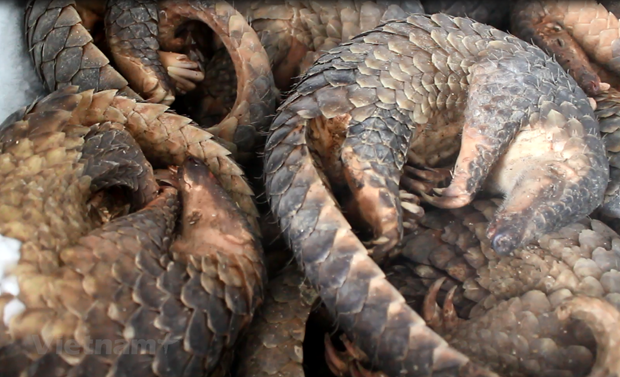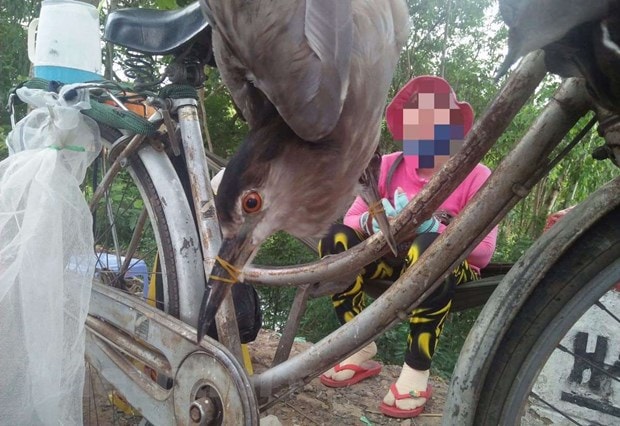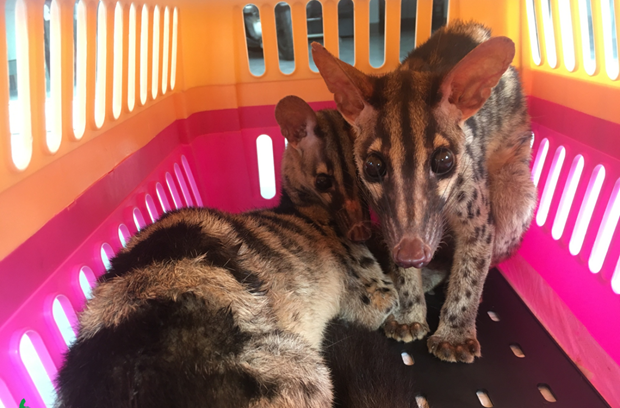Open letter to the Prime Minister on the actions of nature conservationists in the fight against COVID-19
On the morning of February 16, non-profit organizations operating in the field of nature and wildlife conservation sent a letter to Prime Minister Nguyen Xuan Phuc proposing 7 actions to combat the COVID-19 pandemic.
 |
| Pangolins can be an intermediate host for transmitting acute respiratory infections caused by the new strain of Corona virus (2019-nCoV). Photo: Hung Vo/Vietnam+ |
In the face of the complicated developments of the acute respiratory disease caused by the new strain of Corona virus COVID-19 (nCoV), on the morning of February 16, Vietnamese and international non-profit organizations operating in the field of nature and wildlife conservation sent an open letter to Prime Minister Nguyen Xuan Phuc, proposing 7 actions to address threats from illegal wildlife trade.
Fear of viruses from wildlife
According to the letter, the non-profit organizations working in the field of nature and wildlife conservation emphasized that the COVID-19 outbreak has made Vietnamese people worried about their health and caused significant damage to the economy.
Like the SARS outbreak in 2003 that killed five Vietnamese people, the new strain of coronavirus is believed to have been transmitted from wild animals to humans through close contact at a seafood market in Wuhan, mainland China, where illegal wildlife trade took place.
Scientific literature has now proven that the Corona virus originated in bats and was transmitted to humans through an intermediate host, a wild animal. Although the intermediate host that transmitted the COVID-19 epidemic this time has not been definitely identified, a research team in China believes that it could be a pangolin.
“Regardless of the specific species, it is clear that wildlife trade is a cause of disease transmission through close contact between humans and wildlife,” the letter stressed.
A look back at pandemics over the past 20 years shows a clear link to virus “reservoirs” in wildlife populations. For example, the SARS epidemic of late 2002 and early 2003, which infected more than 8,000 people in 37 countries and killed 774, originated from a new strain of betacoronavirus that originated in bats via an intermediate host, the palm civet (Paguma larvata).
Or the Middle East Respiratory Syndrome (MERS-CoV) outbreak in 2012 that infected 2,494 people and killed 858 also originated from another coronavirus strain transmitted from camels to humans. The recent African swine fever (ASF) epidemic that swept through China, Vietnam and nine other countries also caused serious economic losses and is believed to have originated from wild pigs in Africa.
 |
| Birds and storks are tied in bunches and hung on vehicles for sale as if they were deserted. Photo: PV/Vietnam+ |
By the end of 2019, all 63 provinces and cities in Vietnam were affected by ASF with more than 5 million pigs destroyed.
According to Vietnamese and international non-profit organizations operating in the field of nature and wildlife conservation, the ongoing COVID-19 pandemic will certainly cause significant damage to Vietnam.
The initial assessment of the Ministry of Planning and Investment shows that Vietnam's GDP growth target will be 0.53% lower than expected if the epidemic is controlled in the first quarter or 0.71% lower if the epidemic is controlled in the second quarter. So far, Vietnam's aviation industry has also been heavily affected with losses of about VND10,000 billion due to flight cancellations during the epidemic.
Lessons from SARS and now COVID-19 demonstrate that new viruses will continue to be transmitted from wildlife to humans through wildlife trade and consumption. Research conducted in Vietnam and several other countries has demonstrated that coronaviruses exist in wildlife populations and that wildlife trade creates opportunities for viruses to jump from wildlife to humans.
Despite efforts to reform policies and strengthen law enforcement to protect wildlife, the trade and consumption of wildlife in Vietnam remains a problem. In particular, there is an increasing flow of illegal wildlife products from international markets to and through Vietnam.
7 recommended action solutions
Non-profit organizations working in the field of nature and wildlife conservation believe that limiting interactions between wildlife and humans through strong law enforcement against wildlife trafficking and wildlife markets is the most effective approach to reducing future risks related to disease transmission between animals and humans.
“As the source of this particular outbreak, China has taken important steps to reduce the risk of future infectious disease outbreaks by temporarily closing all wildlife markets. This measure is an acknowledgement of the serious threats we face if we continue to ignore the wildlife trade,” the letter said.
 |
| Zebra. Illustration photo |
Therefore, to ensure national safety, economic security and public health as well as to preserve Vietnam's precious ecosystems, non-profit organizations working in the field of nature and wildlife conservation recommend that the Vietnamese Government take strong and sustainable actions to prevent all illegal wildlife trade and consumption.
Accordingly, non-profit organizations operating in the field of nature and wildlife conservation recommend that the Government identify and close markets and locations where illegal wildlife is traded; identify and enforce bans on restaurants that illegally sell wild meat products; and develop strict regulations and procedures to effectively manage commercial farming activities.
On the other hand, the Government needs to issue mandatory regulations for all e-commerce platforms, social media and online newspapers to monitor and remove all transactions and advertisements of illegal wildlife products; develop strict regulations and procedures to effectively manage commercial farming activities.
Along with that, Vietnam needs to reform judicial procedures to improve the effectiveness of deterrence and prevention in handling wildlife crimes; further raise public awareness of the risks of wildlife consumption to public security and public health; and ensure inter-ministerial and sectoral cooperation when implementing the above points.
“In accordance with Directive No. 05/CT-TTg dated January 28, 2020 of the Prime Minister on COVID-19 prevention and control, on February 6, the General Department of Forestry issued a document requesting provincial and municipal authorities to control wildlife trade to prevent the spread of the Corona virus. We support this effort but recommend that the Government take more specific and drastic actions to eliminate future outbreaks of the virus as mentioned,” the petition letter added.
In addition to public health and economic reasons, according to non-profit organizations working in the field of nature and wildlife conservation, these actions will demonstrate that Vietnam is a leading country in the region in combating illegal wildlife trafficking and preserving biodiversity.
Vietnamese and international non-profit organizations operating in the field of nature and wildlife conservation signed a letter to the Prime Minister, including:
World Wildlife Fund Vietnam (WWF Vietnam), WCS Vietnam, Education for Nature, Wildlife at Risk, Animals Asia, GreenViet Center, FFI Vietnam, Center for Wildlife Research and Conservation, TRAFFIC Vietnam, People and Nature Center.

